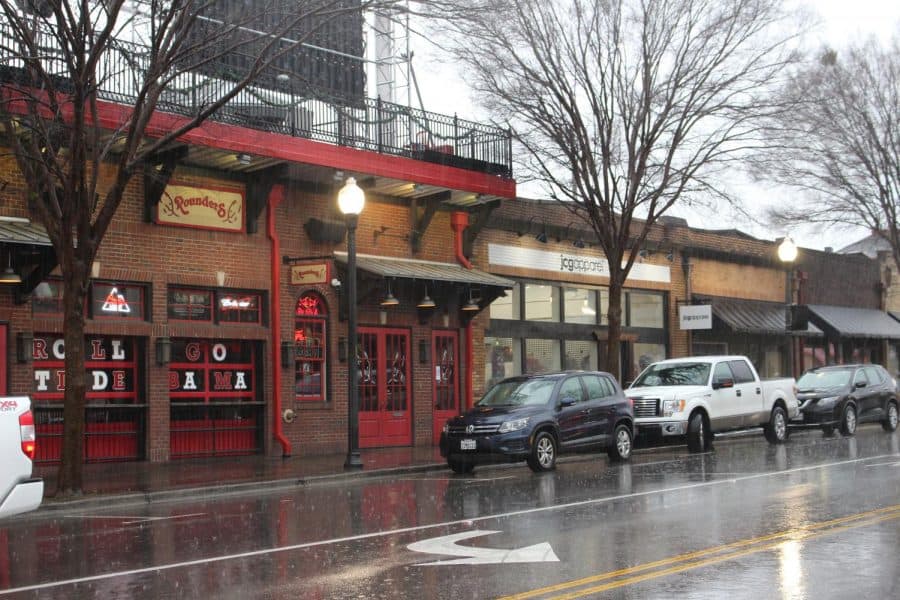Late-night shifts leave no rest for the responsible
January 24, 2019
Oftentimes, students’ days progress like they have for the past 15 years of their life: wake up, go to school, come home and do homework. Every once in a while, a weekday evening might include a social activity. But for some, their schedule is not so predictable.
“I worked for PartyKart, where you take people around in the campus vicinity, mostly to get students home late at night after they go the bars,” Justin Pollard, a senior majoring in criminal justice, said. “It usually ended around 2 at night. … It’ll mess up your sleep schedule to stay up late, and then go to sleep at a normal time a different day. And sometimes if you had something due at a certain time, you just had to stay up late and finish the work.”
According to a 2015 study from the National Center for Education Statistics, 43 percent of college students worked full-time in 2015, with 78 percent of students working a part-time job. As the effects of student debt continue to worsen, many choose to mitigate the financial stress by working through school.
Those who decide to multitask their college life are well aware of the lingering impact of college loans. Another NCES study published in 2015 showed that bachelor’s degree graduates still owed an average of $21,500 after enrolling 20 years previously.
These loans are taken out exclusively for the cost of attendance expenses, not including items like food, clothing and other costs. Working students have to use their paychecks to cover these auxiliary categories. This leaves them with little to save for paying off their loans after graduation.
“Many students may choose to work evenings, particularly if those evening shifts provide better compensation,” Amy Bramlett, manager for Communication & Information Sciences Career Center, said. “For instance, many restaurants are the busiest on the evenings and weekends. Those that make tips often find the increased earning potential found in the evenings and late nights very attractive.”
Businesses cater to the demand for their services, no matter the hour of the day or night, especially in a college town. Fast food restaurants, bars, pizza delivery services, gas stations, pharmacies and many more have extended hours, some being open 24 hours.
For these businesses, someone has to work these long hours. And because some students must work whenever they can, they are the ones taking the graveyard shifts. The financial demands of college life can leave little time for class and homework. This problem is amplified when students must work late hours.
“I work at Waffle House, usually on their third shifts, so when I get off I’m usually super tired and I don’t go to my early morning classes because I just worked a 10-hour shift,” Lexi Gress, a junior majoring in medical anthropology, said. “And when I’m working the shift I’m just mentally exhausted because I’m always kind of babysitting because I’m dealing with drunk people.”
Even if shift workers get enough sleep on recovery days, the unnatural rhythm of their sleep can lead to fatigue and loss of concentration, according to the Centers for Disease Control. This late-shift fatigue can lead to a decrease in general health and productivity for working students.
But private businesses are not the only establishments in need of students willing to work long hours. The University requires a myriad of student employees to function, but perhaps the most ubiquitous job is that of the Resident Adviser (RA). These students often work long, inconsistent hours in a position that is invaluable to freshmen.
“An RA can be up late for a couple of reasons – being on call is probably the main reason, because RAs have to do rounds twice during an on-call shift,” Tutwiler RA Hannah Alford, a sophomore majoring in music education, said. “I have had 8 a.m. classes five days a week since second semester freshman year, and my [on-call] shifts are usually on Thursday nights, which are swap nights, and I’ll usually get calls for lockouts. There was one Thursday night where I got no calls until 11 p.m., and then I got a call for a lockout every two hours after that, then immediately had to go to my 8 a.m.”
In addition to being on call, RAs have to work at their respective residence hall help desks, which are open 24 hours a day. These demands often leave them with irregular sleep schedules that can affect their academic performance and mental health. However, the job is enticing to enterprising students, and the interview process to become an RA is extremely competitive.
“The biggest financial reason people become an RA is because you get free housing,” Alford said.“That’s major for people like me who don’t have a car and don’t have as easy a time of transportation around campus. To have free on-campus housing is extremely helpful.”
Though many have no choice but to work, there are ways to lessen the negative effects of working extended hours. Time management, extensive planning at the beginning of the semester and self care can all help students cope with balancing school and work.
“I’m an advocate for finding a system that works for you and really embracing that,” Bramlett said, “At first you may need to schedule everything you do. Eventually, it will feel natural or like a habit if you just persist. As for professors, just stay in communication with them. Don’t be afraid to tell them about your schedule and your challenges.”
The Center for Academic Success provides resources to students who would like to improve in their courses. They will be holding a workshop on time management in Russell Hall on Jan. 29 at 6 p.m.
“I’ve never asked a professor to push anything back, but usually if I’m feeling stressed and I didn’t get enough sleep the night before, I just try to power through my first classes,” Alford said. “I usually take a much-needed nap and try to spend time with my friends to be able to de-stress and unwind. … I kind of give myself a break in between the night, school and then having to do stuff again.”











